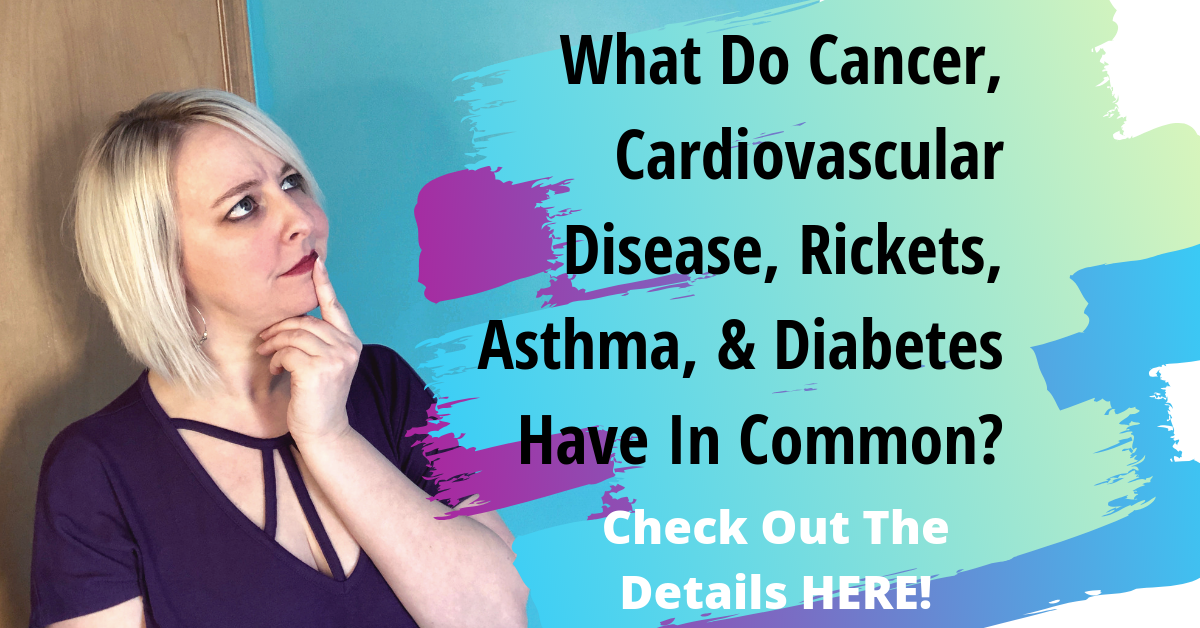 If you’ve read some of my previous posts talking about the importance of sunscreen, then you’ve probably been working to make sure that you and your family are adequately protected from the sun’s harmful rays.
If you’ve read some of my previous posts talking about the importance of sunscreen, then you’ve probably been working to make sure that you and your family are adequately protected from the sun’s harmful rays.
(If you missed the posts and would still like to check them out, click here for my 5 tips on how to choose the right sunscreen and here for 5 reasons not to buy a sunscreen with a higher SPF rating.)
The one downside to sunscreen? You likely aren’t absorbing that much needed vitamin D because the body makes vitamin D when your skin is exposed to sunlight.
So when you are using sunscreen, it effectively blocks out the suns rays, leading to a lack of vitamin D, or vitamin D deficiency. Of course, that’s also if you are using the right sunscreen (my recommendation is mineral sunscreen) and apply it as frequently as recommended on the bottle.
Now, don’t get me wrong. In no way am I saying that you should forgo sunscreen in order to get more vitamin D from the sun. In fact, physicians and scientists agree that there is no safe level of the sun’s UV, or artificial UV, exposure that allows for maximal vitamin D synthesis without increasing your risk of skin cancer.
So put on that sunscreen!!
And since you are using that sunscreen then it’s important to ensure that you are getting your vitamin D elsewhere. 🙂
If you are still on the hunt for a good mineral sunscreen, please contact me directly by clicking here!
Download My 5 MUST-HAVE Smartphone Apps Guide Here
Why is vitamin D important?
Well for starters, a vitamin D deficiency has been linked to health problems such as:
- Increased risk of death from cardiovascular disease
- Cognitive impairment in older adults
- Rickets – a disease where the bone tissue doesn’t mineralize properly, leading to soft bones and skeletal deformities
- Severe asthma in children
- Cancer
There is also research suggesting that vitamin D helps aid in the prevention and treatment of type 1 and type 2 diabetes, glucose intolerance, multiple sclerosis, and hypertension.
So what does vitamin D do exactly, other than potentially help with the above problems?
Vitamin D is a fat-soluble hormone that is essential for growing and maintaining strong and healthy bones. It also helps to support a strong immune system and protect against cancer.
Of course, I’m not a doctor, or any profession in the medical field, but those seem like great reasons to make sure my family and I are getting enough vitamin D for sure!
It’s been years since I’ve had my vitamin D level tested, but many years ago I was diagnosed with a deficiency myself (and because of this I should really be tested again!).
I remember that one thing my doctor did note, at that time, was that a vitamin D deficiency can also affect one’s mood……..so basically it can help fight depression. Which is likely why so many of us who live in the northern part of America frequently suffer from Seasonal Affectiveness Disorder during the winter time (no sun = little to no vitamin D from the sun).
Because of all of the reasons above, vitamin D supplementation is necessary for many of us (and be sure to get your vitamin D level test by your doctor).
It’s important to note that people who live in areas that are closer to the equator are less likely to suffer from vitamin D deficiency, but that doesn’t mean that it’s not possible to develop a deficiency even if you do live in an area with ample sunlight all year round so please consider speaking with your doctor as well.
You can get vitamin D from some foods. But most contain only small amounts that are not high enough to meet daily requirements. However, if you would like to try to get your supplementation from foods first, then give these foods a try:
- fish and fish oils
- egg yolks
- fortified milk
- beef liver
If you don’t like the foods above, or just don’t eat them, then vitamin supplements really do seem to be the best answer when it comes to making sure you, and your family, are getting enough vitamin D.
And since supplements are so readily available in the US, we can still stay safe in the sun by using our mineral sunscreen (that’s free of oxybenzone and octinoxinate)! For more on oxybenzone and octinoxinate, check out my post here.
If you’d like my recommendation on the best mineral sunscreen available, please contact me by clicking here!
And make sure you stay in the loop by picking up my FREE Guide, My 5 MUST-HAVE Smartphone Apps Every GOOD Mom Should Have to Keep Their Family Safe and Healthy by clicking the button below!
Download My 5 MUST-HAVE Smartphone Apps Guide Here
I hope that you have found some value in the information about vitamin D above, and are able to put them to good use!
If you have found value, please share by clicking on the icons below this article so that I can help your friends and loved ones as well!
Until next time……..
Here’s to achieving true wellness!

*Legal Disclaimer – All information provided above is for educational purposes only. Information should not be construed as medical or legal advice in any capacity and is not intended to prevent, diagnose, treat, or cure disease.